
Angry Democrats have threatened retribution against Green Party candidate Ralph Nader if Vice President Al Gore is declared the loser in the presidential election. Nader won 3 percent of the nationwide vote, obtaining 2.6 million votes, but Democrats say that his totals in the closely contested states of Florida, Oregon and New Hampshire were well above the margins there between Gore and Bush. [includes rush transcript]
We now turn to Ralph Nader for a response on these accusations, as well for comments on what President Clinton said about him during Democracy Now!’s exclusive interview with him just two days ago.
Guest:
- Ralph Nader, Green Party candidate.
Tape:
- President Bill Clinton, responding to a question from Amy Goodman of Democracy Now!
Transcript
AMY GOODMAN: You are listening to Pacifica Radio’s Democracy Now! I’m Amy Goodman, with Juan Gonzalez.
JUAN GONZALEZ: Good day, Amy, and to our listeners around the country in this incredible — the end of an incredible week here with the entire United States government now virtually paralyzed by the situation with the undecided count in the presidential race. And clearly now, the state of Florida is in an uproar from one end to the other, from the students who occupied the state Capitol in the sit-in in Tallahassee all the way down to Fort Lauderdale and Miami. There are enormous problems that apparently occurred on Election Day. And no matter who a person voted for on Tuesday, it’s critically important, it seems to me, to get the bottom to what appears to have been enormous problems, and a real question now as to whether it was even close in Florida if the votes were properly counted between Al Gore and George Bush.
AMY GOODMAN: Juan, give us some examples, because the latest, you know, overall figure we have is that George Bush has edged out Al Gore by 327 votes, which would throw Florida’s twenty-five electoral votes to the Texas governor.
JUAN GONZALEZ: Well, as I reported in a column in today’s Daily News, there are other areas that are not even — so far have not even really been dealt with by many of the national media. For instance, I spoke with Mitch Caesar, who is the chairman of the Democratic Party in Broward County. He has a separate appeal, and there’s going to be a hearing this morning — over 6,600 votes in Broward County, which — of which Fort Lauderdale is a part — that apparently where people voted, but the computer did not register their choice for president. And they registered the choices for others.
And Caesar is speculating that either one of two things happened. Either 6,600 people in Broward County went into the polling booth but decided not to vote for any presidential candidate, which seems highly unlikely, or they did vote, but they didn’t punch the hole in their cards properly. And the computer, if there’s any problem with a piece of the hole sticking up, will not register the vote.
So he has called for a hand count of the 6,600 votes of Broward County. This has gotten almost no attention. Only the Fort Lauderdale Sun-Sentinel has been reporting it, and my column. But given the fact that Broward County went 64% for Al Gore, just a portion of those votes alone would be decisive in this race.
And then, of course, there is the other unreported situation. I spoke with many Puerto Rican leaders in Orlando, Florida. Orlando is the largest — is the fastest-growing Puerto Rican community in the United States — over 40,000 registered Puerto Ricans in Orlando. And on Election Day, they were confronted with large numbers of complaints of Puerto Ricans who said they were being denied the right to vote, that they were being required to have two pieces of identification instead of one, that they were being sent from one polling place to another, that there were no translators because many people from the island of Puerto Rico come directly to Orlando to work and they have instant rights to vote. But as a result, the Puerto Rican Legal Defense and Education Fund sent a team of four lawyers down there last night to take the affidavits of about 200 people who claimed that they tried to go to vote on Election Day.
And this is not an after-the-fact situation, because according to Evelyn Rivera, the vice-chair of the Orange County Democratic Party, at 2:00 p.m. on Election Day, one of their people called the Justice Department to complain that Puerto Ricans were being denied the right to vote in Orlando, and they registered an official complaint long before anything was known about how close the Florida race would be.
AMY GOODMAN: This reminds me a little of the piece you did earlier this week about New York and the Ballot Security Task Force that Republicans had set up to put off-duty cops at highly immigrant-concentrated polling places to challenge them.
JUAN GONZALEZ: Well, yes. Well, of course, these kinds of reports, as we’ll see later in the hour, were also happening in — came up in the Haitian community of Miami. But the reality is that there’s enormous pressure now on Al Gore and the Gore campaign, from the New York Times today and from many other forces, to put thing to bed, not to challenge it.
But I think that anybody who’s concerned about democracy in this country, including those many people who voted for Ralph Nader or Pat Buchanan or others, have to understand that if it is possible for even Democratic Party voters to be disenfranchised on Election Day, what would happen to the Green Party or what would happen to some other independent party if it ever became a major credible electoral force, so that the fight for enfranchisement and the right to have one person, one vote throughout the country is something that everyone should be concerned about.
AMY GOODMAN: And interestingly, Pat Buchanan himself came out and said that in Palm Beach County, that he did not expect that he got the three times the vote that was the average for Buchanan voters in Florida, an area that was highly unlikely to vote for him.
JUAN GONZALEZ: Well, you know, the reality is that elections in America are very much like the old saying about making sausage. Nobody wants to see the details. And the reality is that most of the time, since elections are not that close, no one ever really looks at the detail precinct by precinct of how votes are tabulated, counted.
In New York City, we had massive problems on Election Day in Brooklyn and other areas in the black community and the Latino community. Had the race been close in New York City, there would have been a major uproar. And so, I think that unfortunately Florida has now put a microscope under the electoral process of the United States and shown major, major flaws that have to be rectified if we’re ever going to have a truly democratic election procedure.
AMY GOODMAN: And certainly, people, especially African Americans in the South, have been complaining about election irregularities and challenges to their right to vote for many years.
Well, we’re joined on the telephone right now by Green Party presidential candidate Ralph Nader, who really epitomizes the issues that we have been talking about, when it comes to democracy and inclusion. He is getting in the last week some heavy hits from the corporate media, particularly the New York Times — a headline in the last few days, “Angry Democrats, Fearing Nader Cost Them Presidential Race, Threaten to Retaliate,” the emphasis that he got close to 100,000 votes in Florida, which would have made the difference for Al Gore. And Senator Joseph Biden of Delaware saying — echoing the sentiments of several other Democrats on Capitol Hill saying, “Ralph Nader is not going to be welcome anywhere near the corridors. Nader cost us the election.”
Ralph Nader, welcome to Democracy Now!
RALPH NADER: Good morning, Amy.
AMY GOODMAN: So, your response to what’s happening in Florida right now?
RALPH NADER: Well, it’s amazing the way these people you just quoted are prejudging the result. They must be possessed of a clairvoyance that’s denied most people in this country. Who knows who’s going to win in Florida? I think Juan said it all, in terms of his comments on the problems, which really are all over the country in terms of election practices, procedures, machines, counting, civil rights issues, and so forth. But right now, nobody knows who’s going to take it. And yet, they’re all making these portentous judgments as if it wasn’t George W. Bush who might have defeated Al Gore. George W. Bush took ten times more Democrats in Florida from Al Gore than I did.
JUAN GONZALEZ: Well, you know, Ralph, in my news room at the Daily News, I had been under a withering attack by many of my colleagues for a couple of the columns that I wrote basically defending your right to run as a presidential candidate and the importance of your candidacy. They’re all blaming me for —
AMY GOODMAN: Juan’s a very powerful man.
JUAN GONZALEZ: — for the alleged Bush victory. But I reminded them that I don’t recall that when Ross Perot ran in '92 and ’96 and it took a huge vote, that there was this incredible uproar in the press and in political circles about how Perot was a spoiler. In fact, people were talking about how we was bringing a refreshing new look into American politics, raising the issues like the budget deficit that the other politicians weren't paying attention to. And there didn’t seem to be the vehemence of the attacks on Perot that there have been on you. What’s your sense of that?
RALPH NADER: Well, that’s very true. The worst they could say about Perot was that he was eccentric. And yet, he was a far more expansive challenger to the two parties because he had tens of millions of his own dollars to spend. And he got regular news television coverage, not an occasional feature.
The New York Times, I think, epitomizes the point you’re making. Not only was their coverage very spotty, but the editorials were — I don’t know what the word is. I mean, they were so inflammatory that they boomeranged on them. But the interesting thing is that at the core of the editorial was not any objection to my positions, many of which were echoed by New York Times editorials in the past months and years, but they never mentioned my position. They said, “How dare he clutter the field?” to use their words and — as if there’s just two enshrined parties, no competition should be allowed and they should fight it out on very narrow ground. It’s really quite upsetting in that sense.
I don’t know. Maybe somebody can analyze the frightened liberal mind here when you had Alan Dershowitz calling my campaign and challenge “undemocratic,” was the word he used. Undemocratic. I thought that lots of competition and broader issues and broader choices for the American people was the essence of enlarging our electoral democracy.
AMY GOODMAN: I wanted to play for you a question I asked President Clinton the other day when he was calling into radio stations around New York to encourage people to get out and vote, I guess for his wife, for Hillary Rodham Clinton, and also for Al Gore.
AMY GOODMAN: Many people say that Ralph Nader is at the high percentage point he is in the polls because you’ve been responsible for taking the Democratic Party to the right. What do you say to listeners who are listening around the area right now —
PRESIDENT BILL CLINTON: Well, I’m glad you asked that.
AMY GOODMAN: — to allay their concerns?
PRESIDENT BILL CLINTON: I’m glad you asked that. This is the last question I’ve got time for. I’ll be happy to answer that.
What is the measure of taking the Democratic Party to the right? That we cut the welfare rolls in half? That poverty is at a twenty-year low? That child poverty’s been cut by a third in our administration? That the incomes of average Americans have gone up 15% after inflation? That poverty among seniors has gone below 10% for the first time in American history? That we have the lowest African American, the lowest Latino unemployment rate in the history of the country? That we have a 500% increase in the number of minority kids taking advanced placement tests? That the schools in this country, that the test scores among — since we’ve required all of the schools to have basic standards, test scores among African Americans and other minorities have gone up steadily?
AMY GOODMAN: Can I say what some people —
PRESIDENT BILL CLINTON: Now, let me just finish.
AMY GOODMAN: Let me just say —
PRESIDENT BILL CLINTON: Let me — now wait a minute. You started this. And every question you’ve asked has been hostile and combative, so you listen to my answer. Will you do that?
AMY GOODMAN: They’ve been critical questions.
PRESIDENT BILL CLINTON: Now, you just listen to me. You ask the questions, and I’m going to answer. You have asked questions in a hostile, combative, and even disrespectful tone, but I — and you have never been able to combat the facts I have given you. Now, you listen to this.
The other thing Ralph Nader says is that, you know, he’s pure as a Caesar’s wife on the environment. Under this administration, 43 million more Americans are breathing cleaner air. We have safer drinking water, safer food, cleaner water. We have more land set aside than any administration in history since Theodore Roosevelt. We have cleaned up three times as many toxic waste sites as the previous administrations did in twelve years. And we passed a chemical right-to-know law that’s a very tough law. It’s the best environmental record in history.
Al Gore’s opponent — and one of the two of them are going to be president — Al Gore’s opponent has promised to weaken the clean air standards and repeal a lot of the land protections.
AMY GOODMAN: President Clinton in an interview we did with him two days ago here on Pacific Radio station WBAI. Ralph Nader, your response?
RALPH NADER: Pretty simple. The welfare reform was pretty phony, as his key advisor Peter Edelman has written about, and others. Basically, what he’s doing is he’s taking credit for a booming technology-led economy. That’s all. None of these things that he talked about in the economy were due to him. He hasn’t even raised the minimum wage to the level that it was in 1968, adjusted for inflation, where it’d be $7.30. It’s now $5.15.
So this is what Clinton and Gore do. They say, “We created so many jobs. We did this.” They didn’t create any jobs. First of all, they don’t have a fiscal policy that pump-primes the economy. And second, they’re monetary policy is not very stimulative of the economy, because it was conducted by Alan Greenspan, a Republican, who he re-appointed. And so, I really don’t know what he’s talking about.
He’s crowing about child poverty going down to the level of 1980. Boy, that’s really a great win. It’s now about 20% to 34% in the District of Columbia, 25% in California when it was only — only — 15% in 1980 in spite of all of this economic growth. You know, when you have twenty years of aggregate economic growth and you say that child poverty’s now as low as it was twenty years ago, that’s nothing to crow about.
On his environment — he neglected to mention WTO and NAFTA and the horribly worsened conditions on the Mexican border in terms of pollution and infectious diseases, about which he’s done nothing. He failed to mention that he didn’t advance solar energy, that he continued subsidies to nuclear power and the fossil fuel giant corporations. He failed to recognize that he’s given the biotech companies a free ride with no regulation. Genetically engineered seeds, etc., the US Department of Agriculture has approved every single proposal of the biotech industry.
AMY GOODMAN: Ralph Nader, we have to break for stations to identify themselves. But when we come back, we want to ask you what you’re going to be doing now, and are you going to be building the Green Party as a challenge? And also, do you see that the whole — what is some of the headlines — state of confusion that is Florida right now that could throw the whole presidency —- who knows? Maybe Gore and Bush will neutralize each other, and you’ll be president. It’s not really clear what’s going to happen. But -—
RALPH NADER: And, Amy, he gave the auto industry eight years free ride with no fuel efficiency standards. Bush couldn’t have done worse on that, either.
AMY GOODMAN: Well, let’s take a break, and then we’ll come back and find out about your plans. You’re listening to Pacifica Radio’s Democracy Now! Our guest is Green Party presidential candidate Ralph Nader.
[break]
AMY GOODMAN: You’re listening to Pacifica Radio’s Democracy Now!, the Exception to the Rulers. I’m Amy Goodman, here with Juan Gonzalez. Our guest is Green Party presidential candidate Ralph Nader, in the crosshairs of a lot of Democrats right now who say he lost the race for Gore, though if you just tuned in, Ralph Nader was just saying it is not clear who won this race at this point. Juan?
JUAN GONZALEZ: Yeah, Ralph, I’d like to ask you, in case the Gore campaign does decide to go through with these court suits, would you or the Green Party consider backing the suits in an effort to at least defend the right to vote of the people of Florida?
RALPH NADER: Well, we wouldn’t have standing to do that. As pointed out by lawyers, the only standing would be the voters in the state of Florida.
JUAN GONZALEZ: Right. But you had voters in some of those counties.
RALPH NADER: Yeah. Well, that’s up to them. We don’t even know who they are.
AMY GOODMAN: Well, what about your plans right now?
RALPH NADER: Well, we’re going to build a third party. We came out of the election with the largest third party in America by far, replacing the Reform Party. And it’s time to move it to the next stage with more local, state and national candidates, to try to have campus Green chapters around universities and colleges around the country, to have a Green presence here that will be a watchdog party, pushing issues like universal health insurance and repeal of Taft-Hartley.
AMY GOODMAN: Now you didn’t get the 5% you needed for federal matching funds.
JUAN GONZALEZ: Matching funds.
AMY GOODMAN: Why do you think you didn’t?
RALPH NADER: Well, I think the Democrats played a lot of dirty tricks, which will come out eventually in terms of the mass phone calls that they made — really disgraceful. And I think, second, they scared the Democrats. They really got their votes back from us, because in places like New York or New Jersey where Gore was way ahead month after month in the polls, people would vote for Gore, because they saw the national television news that the race nationally was going to be close. I think they got cold feet in the ballot box. And the Democrats were anticipating that and worked very hard, unleashing their long abused and neglected progressive Democrats, who didn’t get their phones returned until recently, saying, “Quick! Save the campaign! Go around the country and take votes away from the Nader/LaDuke candidacy.”
AMY GOODMAN: Ralph Nader, did, in the very end, Gore try to meet with you to try to get you to pull out?
RALPH NADER: No, he did not.
AMY GOODMAN: Well, last comments to the listeners, as you end this presidential race and you deal with people who you gave a tremendous amount of hope to, but also people like Kate Michelman, president of NARAL, who said that you helped bring in — though we don’t know at this point who is president — an anti-abortion candidate, as well as a number of other people who are holding you responsible.
RALPH NADER: Well, first of all, I’m of the school of thought that says Roe v. Wade is established. It’s not going to be overturned unless the Republican Party wants to destroy itself. As many Republican operatives have told me, they’re not going to destroy their party over this.
And second, we’re building a progressive, long-term political reform movement. You know, corruption in Washington is so bad that neither Bush nor Gore really makes the decisions in one department after another, Defense and Commerce and Labor and Agriculture. They’re made by the permanent corporate government swarming with 9,000 political action committees and 22,000 corporate lobbies.
So we’re now inviting people to tell us whether they’re interested in running for office and organizing local parties all over the country, Green parties, and in contributing to our campaign through the internet. Our web site is votenader.com or votenader.org. We welcome financial contributions only from individuals. And we welcome volunteer people who are in it for the long run.
Our country is way below its promise. There’s mass poverty, all the rest of it; one out of every three workers not even making a living wage, for example; huge diversions of public budgets away from communities and neighborhoods into corporate subsidies, handouts, giveaways, and then relinquishment of our sovereignty to local, state, and national to WTO and NAFTA.
Now, all of these issues are exactly the same for Clinton/Gore and for Bush/Cheney/Lieberman. They’re all on the same page. When it comes to corporate power, they will never challenge it. They will take money from corporations. They won’t challenge their control over our government. And it’s that point that’s the bottom line.
AMY GOODMAN: Ralph Nader, I want to thank you very much for being with us, Green Party presidential candidate.


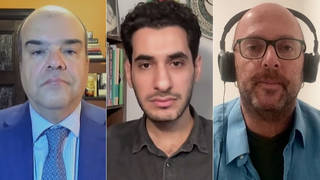
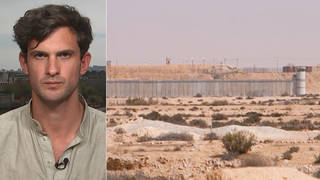
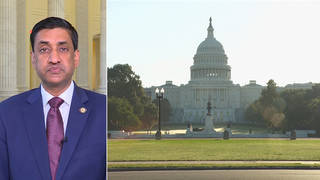





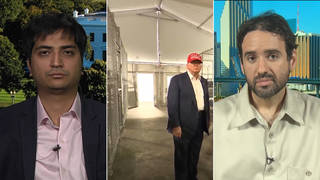
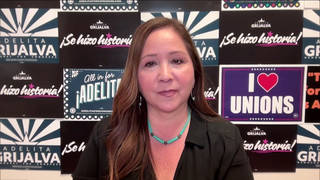
Media Options